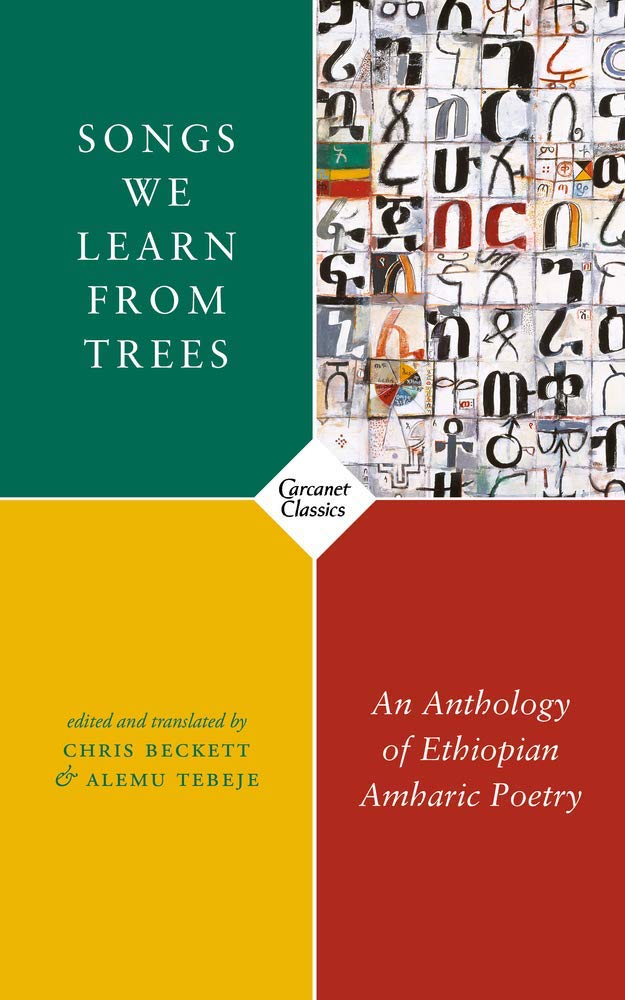I spent my boyhood in Ethiopia in the 1960’s but came to its poetry quite late. I was trying to find models to inspire me (i.e., to imitate!) when writing poems about my love of and experiences in the country, which I called Ethiopia Boy (Carcanet, 2013). I met Zewdu Milikit for the first time in his home city of Gondar, a lovely mountain town in the north of Amhara province which used to be the capital of Ethiopia. We sat having breakfast while Zewdu explained some of the poetics and meanings behind his poems. He introduced me to the most popular line in Ethiopian poetry which is called yewel bet (common line), composed of 12 syllables divided into 2 x 6 with a pause in the middle, like an alexandrine. This is the benchmark of all Amharic poetry, including folk, minstrel and literary poems. It is what poets play with too, as we shall see in this poem.
Zewdu also reminded me, between sips of very strong coffee, about the tradition of semenna worq (wax and gold), which is all about hidden meanings, using homophones or puns that allow more than one reading at once. It grew out of q’ene, religious poems (introducing profane or sexy subtexts), but extends into all spheres of Ethiopian poetry, whether personal or political. It provides depth and wit (not to say laughter and fun!) to the most poker-faced of poems, and criticism of powerful people in a state which has not brooked much overt dissent for centuries.
We discussed many of Zewdu’s poems in some detail that morning. But not “My Silly Stomach.” All he said about this poem was that stomachs can sometimes be political. So I knew straight away that the stomach in question is not just a stomach. In Amharic hodé (my stomach) can also mean “my sweetheart” or “my darling,” which is telling in a country whose history is plagued with food insecurity. So the title “my silly/foolish stomach” has an affectionate tone, a gentle ribbing, which makes what the stomach does in the poem even more sinister: it basically starves the rest of the body to indulge its own pleasure and importance. Hodé does not have other dictionary meanings as far as I know (apart from stomach and darling), but the gold meaning beneath the affectionate wax surface is clear: this is an allegorical poem ridiculing the fat cats who are starving ordinary people to keep the lion’s share of riches and power to themselves. It is actually a small angry poem about inequality in Ethiopia, and by implication in the wider world too.
But Zewdu’s poem is all about lightness and wit: he mixes 12 syllable yewel bet lines with 6 syllable half-lines, making the poem very light and quick on its feet; he subverts the traditional aabb rhyme scheme and keeps readers a bit off-balance with a/bb/ccc/d/ee. So the task of translating this poem is to convey Zewdu’s clear message while staying true to his wit and lightness. As usual I decided not to try and reproduce his syllable count or rhyme scheme, because I find that always takes me away from the feel of a poem rather than closer to it. But I did use shortish lines so the poem moves quite lightly, and when I saw the last line with the paunch (ቦርጭ, or borch in Amharic, and the final ‘ch’ is a plosive one), I knew I wanted to rhyme it with something that would pack a punch…which turned out to be the perfect word, a really (for me at least) pleasing half-rhyme, both visual and aural.
I think these stylistic choices, which are quite obvious, of course, help the poem’s message to sound strongly in English. The only word that really gave me a problem was mogn, the first word of the title so in pride of place. It is normally translated as “foolish” and the verb from it means to deceive, cheat, fool. But for me, foolish sounds more judgmental than satirical: I find it too heavy for the poem, at least in English. It also brings foolish virgins to my mind, which I’m not sure is there in the Amharic! ‘Silly’ accords more with the affectionate sub-meaning hodé, ‘darling.” But like so many choices in translation, I do miss the outright condemnation of “foolish,” for it is clearly not morally nor socially or politically wise to starve the population, just to make a few cats fat!
Zewdu’s poem is typical of many Amharic poems I have translated and fallen in love with in the process: consciously or unconsciously, I borrow some of their images and wit, their poetic strategies. For example, in my latest collection Tenderfoot, which is about my memories of child hunger and famine in Ethiopia in the 1960s, I wrote my own stomach poem: Praise Shout for a Stomach. This is in the style of a praise song for a great man, but although the stomach is great and proud, it’s boy-owner cannot afford to feed it: how dare I wail my banquet of thin songs? he asks, reflecting my own feelings of guilt and inadequacy faced with a situation I could do nothing much about. It’s a sort of ironic praise shout, because the object of praise is not so great any more! And it is allegorical in the same way as Zewdu’s poem, using a common body part to talk about a huge humanitarian or political issue in a quite light, amusing way.




